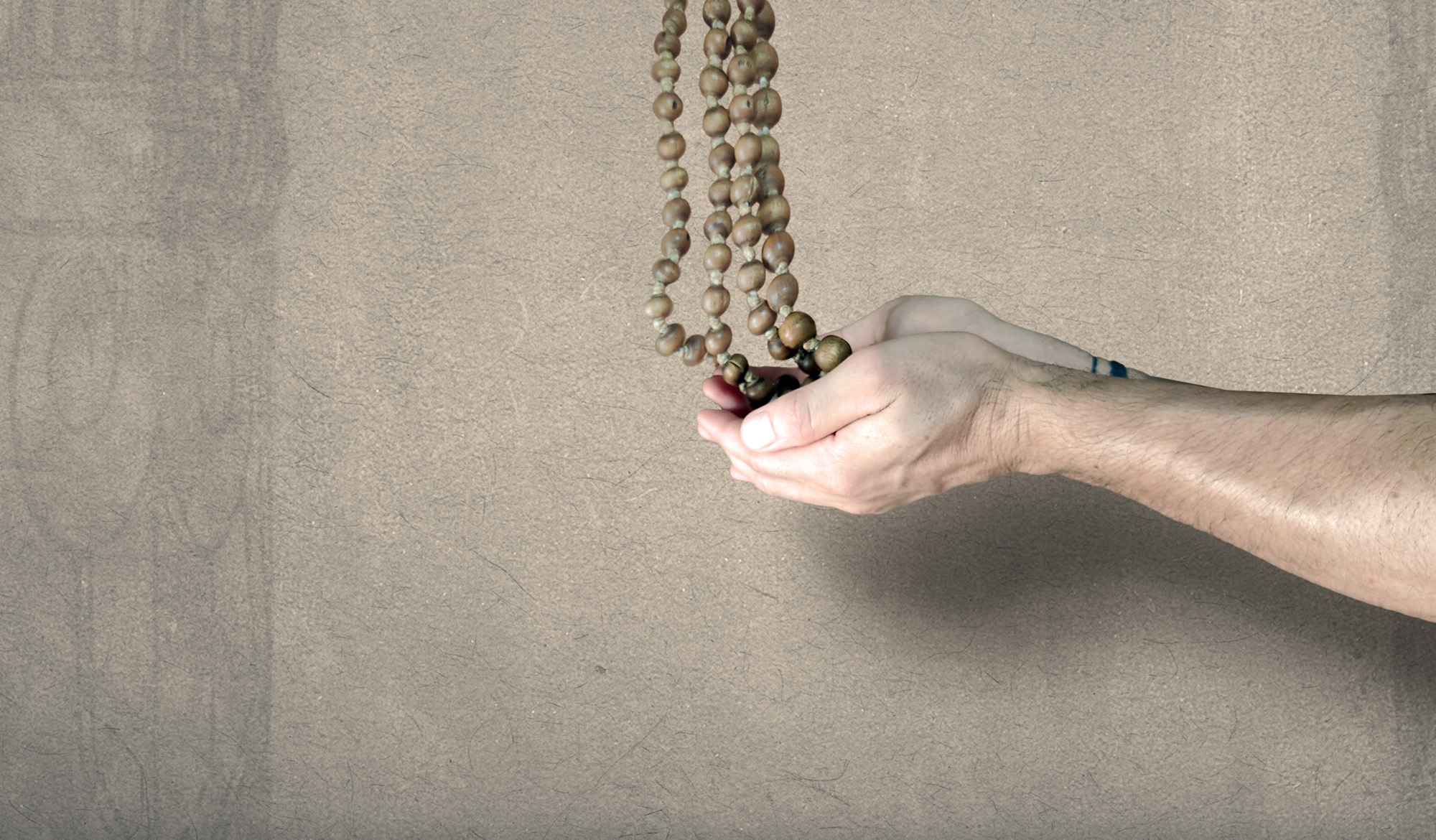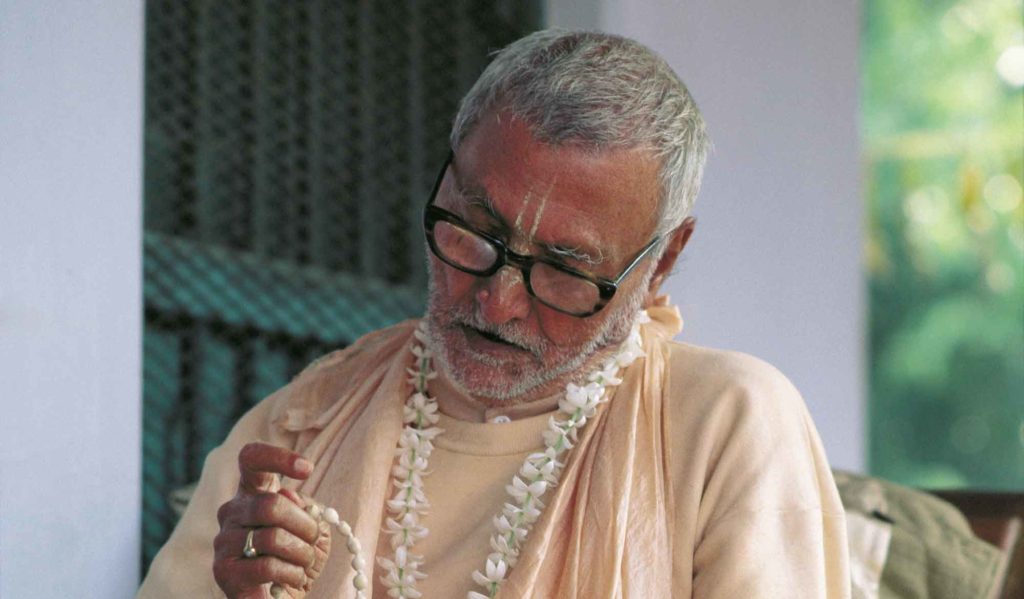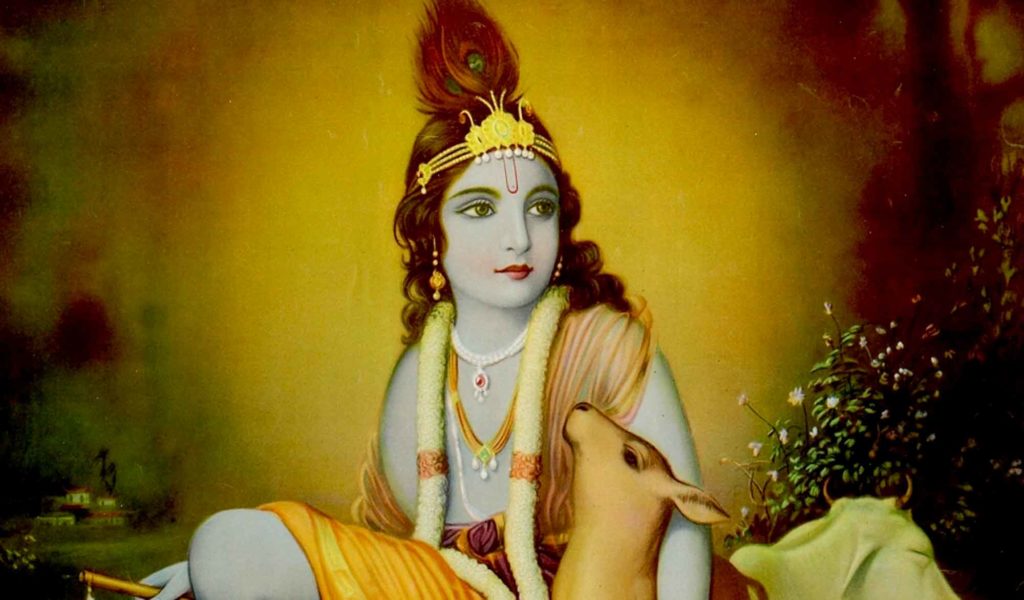Overview
Is a guru necessary? In this article Gaura Gopāla Dāsa answers this question by discussing the qualities of a genuine spiritual guide, but also points out that a genuine disciple is also necessary in order for the relationship to bear fruit.
The Guru Principle
There are certain principles in Gauḍīya Vaiṣṇava siddhānta that are so intrinsic that they have been described as a tattva, or truth. These are categories that describe a particular aspect of the essential philosophy of this lineage. These tattvas are not suggestions or relative truths – they are core principles of the siddhānta that cannot be ignored or bypassed without consequences.
Guru-tattva is one such intrinsic principle, without which progress on the path of self-realisation becomes impossible. We find the instructions to accept a qualified guru throughout the Vedic literature and general culture of Bhārata-varṣa. Kṛṣṇa Himself accepts a guru and takes on the role of guru. This is also seen in the life of Śrī Caitanya Mahāprabhu.
Unqualified Gurus
As with any spiritual truth, with the passage of time in this distorted plane of existence, it becomes weakened. The details become oversimplified and convoluted and thus it is nearly impossible to separate truth from fiction.
evaṁ paramparā prāptam imaṁ rājarṣayo viduḥ
sa kāleneha mahatā yogo naṣṭaḥ parantapa
“In this way, O conqueror of the enemy, the pious rulers understood this path of knowledge through the disciplic succession. However, this knowledge of yoga has been lost due to the influence of time.” (Gītā 4.2)
That is the nature of this material world – everything tends towards disorder and degeneration. Due to this natural state of affairs there are many unqualified persons who have taken on the position of guru but are incapable of executing the function of a spiritual master. In some cases people take up the role of spiritual guide with good intentions, but due to various reasons have become corrupted in the process. Some simply wish to take advantage of such a position for money, fame and followers.
guravo bahavaḥ santi śiṣya-vittāpa-hārakāḥ
durlabhaḥ sad-guru devī śiṣya-santāpah-hārakaḥ
“Many gurus take advantage of their disciples and plunder them. They exploit their disciples, and use them to amass wealth, but a guru who can remove the miseries of his disciples is very rare.” (Purāṇa Vākya)
In general, this leads people either to the complete rejection of the concept of guru or to the idea that although a guru is necessary, total dedication to a guru is not.
Many seekers have undergone bad experiences and been misled, while others who, finding nothing better, continue to follow unqualified masters.
As Kṛṣṇa Himself tells Arjuna in Bhagavad-gītā, vāsudevaḥ sarvam iti sa mahātmā su-durlabhaḥ (knowing Me to be the cause of all causes and all that is. Such a great soul is very rare). In order to reach the proper conclusion on guru, one must come armed with two things – knowledge and sincerity.
Guru is One
The guru principle is one, but comes in different forms – such as caitya-guru (the guru within the heart), śikṣa-guru (the guru who instructs us in the process of bhajana), vartma-pradarśaka-guru (one who initially helps to bring us to the path of devotion), and, of course, dīkṣā-guru – the formal guru who initiates his disciple with mantra and so forth. The guru-principle is not a singular concept but pluralistic by nature. Simultaneously, it is collectively known as akhaṇḍa-guru-tattva, the indivisible guru-principle.
The Necessity of Guru
The first step in many fields of ordinary life leads us to search for a guide, whether it be in music, art, mathematics, or the mechanic’s workshop – what to speak of such an esoteric path of life. In the search for the highest truth, we cannot walk alone without getting lost. We need a guide, a guru, who can show us the way.
The concept of the ‘self-made man’ is a myth! In reality we are dependent upon others from the moment of birth until the moment of death. If we can understand that we need help in the search for higher truth, then we will grow in the company of saints instead of struggling with our own egos in the echo chamber of our minds. If we do not find guru we will find ourselves bogged down in a selective plane of intellectual pursuit, which only delves into the realms of spiritual life that conform to our prejudiced conception of reality.
In our search for truth our first priority must be to find a qualified teacher (adau guru-pādāśraya), but how are we to know who is genuine? Who has the answers and experience and who is simply posing in the position of guru? We have to be aware of the qualities of a real guru and find someone who possesses them. We cannot be sure of someone’s authenticity simply because we like what we hear. Many times, the answers we like and the answers we need are two very different things. We must also understand that it is not only the guru that must be genuine and possess the qualities of a spiritual leader – the disciple must also possess humility, sincerity and the desire to serve. If either one does not possess the necessary requirements, then the clarity of purpose is lost and the guru-disciple relationship loses its meaning.
Genuine Guru or Genuine Disciple?
We often think that it is only the genuine guru who is rare, but the fact of the matter is that both genuine gurus and genuine disciples are rare. Imitation diamonds are available on the market because there are buyers who want a cheap imitation of the real thing. We always hear about the false gurus that are causing chaos around the world, but never about the unqualified disciples who make it possible for them to do what they do. If all disciples were genuine then we would find that bogus gurus would not be so successful.
Śrīla Bhakti Pramoda Purī Gosvāmī Mahārāja describes the relation between unqualified guru and disciple very clearly.
“In view of the great importance and the responsibility involved in giving and taking initiation, it is regrettable that in most circumstances both disciple and guru are unqualified for their role and the value of the sacrament is lost. Some persons call themselves guru when they do not have the gravity necessary for the task. They merely play the role of a bonafide spiritual master out of insolence. Similarly, a disciple in name only will pretend to have the humility of a spiritual seeker. These two types of persons find each other out and use each other for material gratifications such as wealth, fame, and prestige.” (The Art of Sādhana, Ch. 7)
If we fall into this trap and fool ourselves into such a position then how will we make progress in our spiritual search? First and foremost, our sincerity and determination must be unquestionable before we can move onto understanding the qualities of a real guru.
Being followers of sanātana-dharma, we understand that the first aspect of guru we come into contact with is known as caitya-guru. This is Kṛṣṇa residing in the heart as a passive guide (Paramātmā). If we have real sincerity and hold strong in the search for truth, then this aspect of caitya-guru will help to reveal the personal aspect of guru (mahānta-guru).
The Definition of Guru
The actual word ‘guru’ has its roots in Sanskrit. Guru is generally translated as a teacher or spiritual guide, but a more literal translation gives more clarity as to the meaning. The syllable gu means the darkness of ignorance and ru means the light of knowledge which dispels that ignorance. So the guru is a person who bears that torchlight of knowledge and dispels our ignorance. This gives us some idea as to the role of a guru. However this definition is still quite generic. What are the actual qualities of a guru and how do we understand them? The Vedic scriptures and Vaiṣṇava literature describe the guru as the living principle of what he teaches.
ācinoti yaḥ śāstrārtham ācāre sthāpayaty api
svayam ācarate yasmād ācāryas tena kīrtitaḥ
“An ācārya is one who fully understands the conclusions of the revealed scriptures and whose behaviour reflects his deep realisation. He is a living example for he teaches the meaning of the scriptures both by word and deed.” (Vāyu Purāṇa)
An ācārya (one who teaches by example – ācara) exemplifies his instruction by his actions and behaviour. He is an ambassador for the Absolute Truth and a representative of his own guru. He can be in any stage of life and from any social background. He is not limited to being born in a particular caste or race, but must be recognised by his internal qualities – we should never allow such external impressions to obstruct our search.
kibā vipra kibā nyāsī śūdra kene naya
yei kṛṣṇa-tattva vettā sei guru haya
“Whether one is a brāhmaṇa, a sannyāsī or a śūdra – regardless of what he is – he can become a spiritual master if he knows the science of Kṛṣṇa.” (Caitanya-caritāmṛta, Madhya-līlā 8.128)
A real guru’s speech is beneficial for all, but the substance of his words may sometimes be painful to hear. A genuine guru does not shy away from pointing out our defects – like a friend who has only our best interests at heart, or a doctor who sees the necessity of surgery in order to save the life of a patient.
The Connection to Guru
When the qualities of a mahānta-guru become clear to us, only then can we understand how very rare it is to find someone of his caliber who is the clear representation of the Absolute Truth. If we are fortunate enough to come in contact with such a person, we should take shelter of them and dedicate ourselves to their service. This is a fundamental piece of the puzzle for anyone serious about the path of self-realisation. This service connection from guru to Kṛṣṇa through the disciplic succession cannot be overemphasised enough.
Initially we have no experience of Kṛṣṇa, nor do we have a personal relationship with Him, but we can have that relationship with guru and sādhu. If we cannot see Kṛṣṇa manifest in the form of guru then we will struggle to see him anywhere. Just as Duryodhana could not find anyone more qualified than himself, we will find ourselves in the same dilemma – suspended in the land of suspicion and doubt.
For the development of a serving mood, this delicate process requires the mercy and helping hand of guru. If we can grasp these important aspects of guru-tattva then we will be able to take shelter under a genuine spiritual guide and our journey on the path of devotion can truly begin.
brahmāṇḍa bhramite kona bhāgyavān jīva
guru-kṛṣṇa-prasāde pāya bhakti-latā-bīja
“When one receives the seed of devotional service by the mercy of the guru and Kṛṣṇa, the Supreme Personality of Godhead, one’s real life begins. If one abides by the orders of the spiritual master, by the grace of Kṛṣṇa he is freed from service to the mind.” (Caitanya-caritāmṛta, Madhya-līlā 19.151)
Related Articles
- Guru is One by Śrīla Bhakti Gaurava Narasiṅgha Mahārāja
- Omniscience? by Śrīla Bhakti Gaurava Narasiṅgha Mahārāja
- Paramparā by Śrīla Bhakti Gaurava Narasiṅgha Mahārāja
- The Vision of Guru by Śrīla Bhakti Gaurava Narasiṅgha Mahārāja
- Ekalavya and Arjuna by Śrīla Bhaktisiddhānta Sarasvatī Ṭhākura
- Can the Guru Make Mistakes? by Śrīla Bhakti Gaurava Narasiṅgha Mahārāja
- The Post of Guru by Śrīla Bhakti Gaurava Narasiṅgha Mahārāja
- The Compassionate Nature of Śrī Guru by Śrīla Bhakti Kiśora Āraṇya Mahārāja
- Is a Guru Necessary? by Gaura Gopāla Dāsa
Prema Dhāma Deva Stotram with the Narasiṅgha Sevaka Commentary – Verses 61-65
In verses 61 to 65 of 'Prema Dhāma Deva Stotram', Śrīla Śrīdhara Mahārāja narrates the pastime of Śrī Caitanya at Caṭaka Parvata In Purī and explains how the scriptures produced by Brahmā and Śiva are ultimately searching for the personality of Mahāprabhu who is merciful too all jīvas, no matter what their social position.
Prabhupāda Śrīla Sarasvatī Ṭhākura’s Visit to Ayodhyā
With the forthcoming observance of Śrī Rāma Navamī, we present 'Prabhupāda Śrīla Sarasvatī Ṭhākura’s Visit to Ayodhyā' written by Śrīla Bhaktisiddhānta Sarasvatī Ṭhākura Prabhupāda from The Gaudīyā magazine, Vol 3. Issue 21/ In December 1924, after visiting Benares and Prāyāga, Sarasvatī Ṭhākura visited the birth-site of Śrī Rāmācandra in Ayodhyā.
Śaraṇāgati – The Only Path to Auspiciousness
In this article, 'Śaraṇāgati - The Only Path to Auspiciousness', Dhīra Lalitā Dāsī analyses the process of śaraṇāgati (surrender) beginning with śraddhā (faith). She also discusses the role of śāstra and the Vaiṣṇava in connection with surrender.
Ātma Samīkṣā – The Value of Introspection
In this article, "Ātma Samīkṣā – The Value of Introspection" Kalki Dāsa highlights the importance of introspection in the life of a devotee and especially in relation to the worldly environment that surrounds us. He also explains how transcendental sound influences our capacity to introspect.
Prema Dhāma Deva Stotram with the Narasiṅgha Sevaka Commentary – Verses 61-65
In verses 61 to 65 of 'Prema Dhāma Deva Stotram', Śrīla Śrīdhara Mahārāja narrates the pastime of Śrī Caitanya at Caṭaka Parvata In Purī and explains how the scriptures produced by Brahmā and Śiva are ultimately searching for the personality of Mahāprabhu who is merciful too all jīvas, no matter what their social position.
Prabhupāda Śrīla Sarasvatī Ṭhākura’s Visit to Ayodhyā
With the forthcoming observance of Śrī Rāma Navamī, we present 'Prabhupāda Śrīla Sarasvatī Ṭhākura’s Visit to Ayodhyā' written by Śrīla Bhaktisiddhānta Sarasvatī Ṭhākura Prabhupāda from The Gaudīyā magazine, Vol 3. Issue 21/ In December 1924, after visiting Benares and Prāyāga, Sarasvatī Ṭhākura visited the birth-site of Śrī Rāmācandra in Ayodhyā.
Śaraṇāgati – The Only Path to Auspiciousness
In this article, 'Śaraṇāgati - The Only Path to Auspiciousness', Dhīra Lalitā Dāsī analyses the process of śaraṇāgati (surrender) beginning with śraddhā (faith). She also discusses the role of śāstra and the Vaiṣṇava in connection with surrender.
Ātma Samīkṣā – The Value of Introspection
In this article, "Ātma Samīkṣā – The Value of Introspection" Kalki Dāsa highlights the importance of introspection in the life of a devotee and especially in relation to the worldly environment that surrounds us. He also explains how transcendental sound influences our capacity to introspect.








